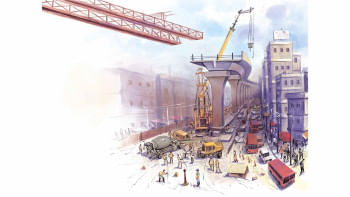Unfinished bridges, unfulfilled promises

The Daily Star's front-page picture of a bridge long in the making in Narail's Kalia upazila, as published on September 20, serves as a poignant reminder of the challenges that often plague infrastructure development in Bangladesh. This bridge, its unfinished pillars reaching out like unfinished promises, was supposed to provide passage over the Nabaganga river – a vital line of communication for local residents. Instead, it has become a picture of "development gone wrong" thanks to poor planning, lax quality control, and negligence by officials that typically bedevil our infrastructure projects.
The story behind the incomplete structure is all too familiar: the first deadline for building the Kalia Bridge, as it is called, ended in June 2019, and over four years later, as our photo reveals, it is still nowhere near completion, leaving local residents with no option but to continuously rely on trawlers and ferries for daily commute. Officials have attributed the delay to a design flaw. It is tempting to accept this as business as usual, but we must be critical given how frequently this – the trend of faulty design and flawed feasibility studies – is happening. Building bridges over rivers is a costly business. There are high economic stakes involved, and citizens deserve answers for lofty development promises left unfulfilled. So we must ask: why did the authorities allow the Kalia Bridge problem for so long?
One of the primary concerns highlighted by this incident is the lack of effective project management and oversight. For any infrastructure project to succeed, it requires meticulous planning, rigorous execution, and constant monitoring. When these critical steps are bypassed or compromised, as seems to be the case with the Kalia Bridge, projects inevitably stall, leaving communities in limbo. Furthermore, the bridge serves as a reminder of the necessity for timely and adequate funding, the lack of which often hampers the progress of projects. Besides, corruption, inefficiency and other bureaucratic challenges can also lead to projects being revised and corners being cut, and ultimately, subpar outcomes.
The situation demands a multi-faceted response. But we must first stress the importance of establishing accountability and transparency in the management of development projects. Concerned officials must provide clear and honest explanations for delays, and corrective measures should be taken swiftly to ensure that mistakes are not repeated. If there were a functional checks-and-balance mechanism in place, there wouldn't be a flawed bridge design in the first place, and any flaw would have been quickly rectified, sparing taxpayers the burden of paying extra for development. We urge the authorities in Narail to quickly finish the Kalia Bridge project.


 For all latest news, follow The Daily Star's Google News channel.
For all latest news, follow The Daily Star's Google News channel. 









Comments